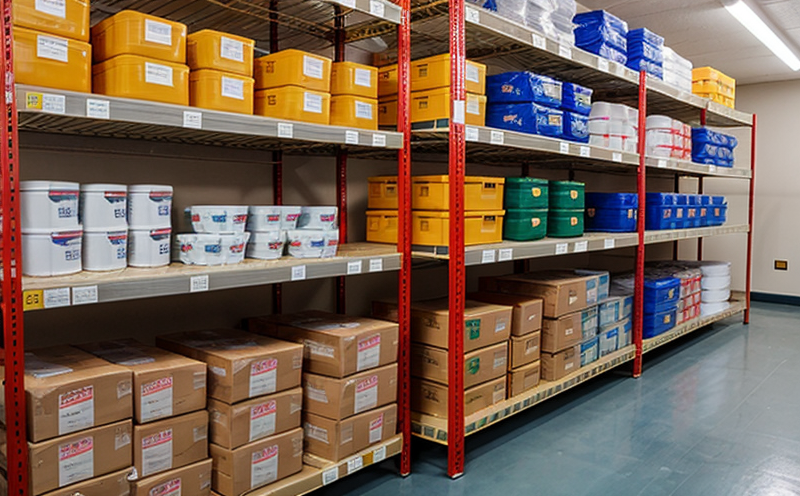Acid Degradation Stability Testing
In the pharmaceutical industry, ensuring product stability is crucial for maintaining efficacy and safety throughout its shelf life. Acid degradation stability testing specifically assesses how a drug formulation behaves under acidic conditions that mimic potential real-world storage scenarios. This type of testing helps in understanding whether the active pharmaceutical ingredients (APIs) or excipients undergo chemical changes that could affect their stability, potency, or safety.
The process begins with selecting appropriate test solutions to simulate various acidic environments encountered during storage and transport. Commonly used acids include hydrochloric acid, acetic acid, and citric acid. These solutions are prepared at specific concentrations and temperatures relevant to the expected conditions of use. The specimens—typically drug formulations—are exposed to these environments for predetermined durations.
During testing, it is essential to monitor changes in critical parameters such as pH, color change, solubility, and degradation products using high-performance liquid chromatography (HPLC), gas chromatography (GC), or other analytical techniques. Acidic conditions can lead to hydrolysis, oxidation, or reduction reactions that alter the chemical structure of the drug substance. Identifying these changes early in development ensures that any necessary adjustments are made before commercialization.
Results from acid degradation stability testing provide critical information for regulatory submissions and help determine the shelf life of a product. Compliance with international standards like ISO, ASTM, and ICH guidelines is paramount to ensure accuracy and reliability of test results. By adhering strictly to these protocols, laboratories can produce consistent data that supports robust decision-making processes within pharmaceutical companies.
Understanding the impact of acidic environments on drug stability allows for better formulation design, storage recommendations, and ultimately improves patient outcomes by ensuring safe and effective medications remain available over extended periods without degradation issues.
Scope and Methodology
The scope of acid degradation stability testing encompasses a comprehensive evaluation of the chemical integrity of pharmaceutical products under acidic conditions. This includes assessing not only the active ingredients but also excipients used in formulations. The methodology involves exposing samples to controlled levels of acidity over specified periods, followed by detailed analysis using advanced analytical tools.
To conduct this testing effectively, laboratories must employ precise methods that replicate real-world scenarios as closely as possible. For instance, temperature-controlled chambers simulate various environmental conditions found during transportation and storage. Specimens are placed in containers filled with buffered or unbuffered acidic solutions, depending on the intended application of the drug.
Once exposed to these environments, samples undergo rigorous analysis using techniques such as high-performance liquid chromatography (HPLC) for quantifying degradation products, Fourier transform infrared spectroscopy (FTIR) for structural identification, and differential scanning calorimetry (DSC) for thermodynamic evaluation. These analyses allow researchers to pinpoint specific areas where compounds may break down more quickly than others.
It is important to note that not all acids behave the same way; therefore, selecting the appropriate model system is crucial. For example, stomach acid contains hydrochloric acid (HCl) and pepsin, which breaks down proteins into simpler peptides and amino acids. Reconstituting a similar environment helps predict how well a drug will withstand gastrointestinal conditions.
Furthermore, accelerated aging studies often incorporate higher temperatures to accelerate potential reactions, allowing researchers to extrapolate long-term stability data from shorter-duration tests. Understanding these factors enables pharmaceutical companies to make informed decisions about product development and labeling.
Eurolab Advantages
At Eurolab, our commitment to excellence in pharmaceutical testing sets us apart as leaders in providing accurate and reliable acid degradation stability testing services. Our state-of-the-art facilities equipped with cutting-edge analytical instruments ensure precise measurements and robust data generation.
Our team of experienced scientists and engineers brings deep expertise across multiple disciplines, ensuring comprehensive coverage of all aspects involved in this type of testing. We follow stringent quality control procedures to maintain consistency and accuracy throughout each project. This includes regular calibration of equipment, adherence to current Good Laboratory Practices (cGLP), and participation in proficiency testing programs recognized by regulatory authorities.
Moreover, Eurolab offers flexible turnaround times tailored to meet clients' needs without compromising on thoroughness or rigor. By leveraging advanced technologies like artificial intelligence-driven predictive modeling tools, we can provide insights beyond mere compliance with standards—giving our partners actionable recommendations for improving product quality and extending shelf life.
We pride ourselves on being a trusted partner in the pharmaceutical industry, offering not just testing services but also consultative support throughout all stages of development. From initial concept through final approval, Eurolab ensures seamless integration into your R&D pipeline, helping you navigate complex regulatory landscapes with confidence.
Quality and Reliability Assurance
Ensuring the quality and reliability of acid degradation stability testing is at the core of what we do at Eurolab. Our rigorous approach to quality management guarantees that every aspect of our service meets or exceeds industry expectations. From sample preparation through final reporting, we adhere strictly to established protocols and best practices.
Our laboratories are ISO/IEC 17025 accredited, demonstrating compliance with internationally recognized standards for competence in testing and calibration services. This accreditation ensures that all procedures followed during testing are validated and reproducible. Regular internal audits conducted by qualified personnel further reinforce these commitments to excellence.
In addition to technical proficiency, we prioritize data integrity and transparency. All results are accompanied by detailed reports detailing methodologies employed, observed phenomena, and conclusions drawn based on analysis. These documents serve as valuable resources for ongoing research efforts or future regulatory submissions.
At Eurolab, we understand that trust is earned over time through consistent performance. That's why our clients can rely on us to deliver accurate, dependable results every single time. Whether you're looking to optimize product formulations or ensure compliance with stringent regulations, rest assured that your needs are paramount in our service offerings.





